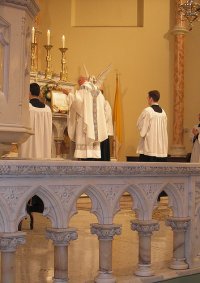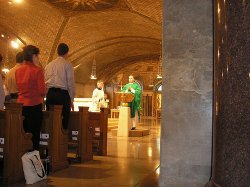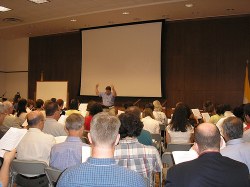

|
|
| Musical Musings: Miscellaneous |
The Paradigm:Reflections on the 2007 CMAA ColloquiumThe 2007 Colloquium of the Church Music Association of America was held June 19-24 on the campus of The Catholic Univeristy of America, in the Basilica of the National Shrine of the Immaculate Conception, and at Mary, Mother of God Church, in downtown Washington DC. Some of my thoughts and impressions, from a first-time participant, follow, along with a few pictures.
MassesWe, the fortunate attendees of the 2007 Colloquium, soon found out. The five daily and Sunday Masses were celebrated in a variety of forms:
Each Mass included the same musical format:
The only exception to this format were the lack of any solo organ music during the Mass in Remembrance of the Deceased Members and the changes from the above format necessitated by the Tridentine Rite. Other than during the Requiem, the organ was skillfully played by a master, David Hughes, from New York City, whose youthful exuberance was also evident in the choral accompaniment he played in rehearsals. Dr.Mahrt was quick to point out that this paradigm is a goal toward which we all should work, but that a certain "gradualism" must be employed in a well-paced and gradual introduction of the elements in a parish setting. A fully-sung Mass with propers, in Latin or in English, thrust all-at-once on a congregation would be as emotionally shocking as was the First Sunday of Advent in 1964, when everyone first witnessed the Mass in English. Gregorian chantThe chant propers were taken from the Graduale Romanum when sung in Latin, and from a newly-commissioned set of propers by The Rev. Samuel Weber, OSB, when sung in English. Scott Turkington, Director of the Stamford Schola Gregoriana in Connecticut, and on the Board of Directors of CMAA, conducted the Men's Advanced Schola. "Superbly refined" are words that come to mind to describe his exquisite directing. A gentle flick of one finger was sufficient cue for cut-offs and ritardandi – after much-repeated admonishments, though, to watch the conductor. "You'll want to draw a little pair of eyeglasses in your music there." Equally competent and effective were Dr. William Mahrt, who directed the Women's Advanced Schola, and Amy Zuberbueler, who conducted the Beginner's Schola. Chants sung included both the new and the familiar:
Sacred polyphonyThe polyphony, sung by the full conference attendees (forming a choir of 140 well-trained voices) was magnificent. At the helm was Dr. Horst Buchholz, Director of Sacred Music and Principal Organist at the Cathedral Basilica of the Immaculate Conception in Denver, Colorado. With his mellifluous voice and German accent, even the slightest request – "Would you kindly not breathe there" – oozed authority. How could you not comply with so firm a request? His insistence on high palates, open mouths and unified vowels produced amazing results. The choral tone was blended, rich and ever-clean. Yet the firm nature of his rehearsing was lightened by a beautifully dry and sharp sense of humor — think Victor Borge. "Sopranos, what kind of entrance was that? Did we wake you?" "Basses, with such scooping you could work at Baskin Robbins!"
Choral music included:
AttendanceAttendance for this year's colloquium was double last year's, thanks in no small part to the energetic and dedicated work of Colloquium Coordinator Arlene Oost-Zimmer and Saced Music magazine Editor Jeffrey Tucker. Registration closed two months prior to the event – numbers could have been substantial higher, had space permitted. Perhaps next year will see a new venue for the CMAA Colloquium, which has now indisputably claimed a place among prestigious and well-run music conferences. You will certainly want to attend next year's event – this was my first time, and the experience was overwhelmingly positive! Check the Church Music Association of America website often for the first hint of Colloquium 2008 ... and by all means register early!! |
 Dr. William Mahrt, president of the CMAA, in addressing the Colloquium, spoke of a paradigm, an "ideal," regarding music at Mass.
We know that the documents give Gregorian chant "pride of place" at Mass.
They further state that the musical treasures of sacred polyphony are to be preserved.
Dr. William Mahrt, president of the CMAA, in addressing the Colloquium, spoke of a paradigm, an "ideal," regarding music at Mass.
We know that the documents give Gregorian chant "pride of place" at Mass.
They further state that the musical treasures of sacred polyphony are to be preserved.

 Mirabilis Deus – Offertory for the Memorial of Saints John Fisher and Thomas More
Mirabilis Deus – Offertory for the Memorial of Saints John Fisher and Thomas More